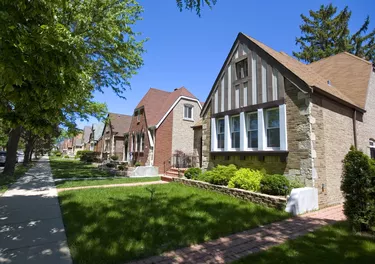
Economists base cost of living figures on the price level of everyday items. Taking into consideration common expenses consumers share, the average cost of living in Illinois depends on the part of the state in which one resides. Residents in different geographic areas of the state pay different prices for the same goods and services. Taken as a whole, the cost of living is highest in the northeastern section of the state and lowest in Southern Illinois, specifically the area known as "Little Egypt."
Northern and Southern Regions
Video of the Day
A cost of living index that sets the national average at 100 shows the Chicago area, in northern Illinois, with an overall cost of living index of 116, the highest in the state. What this means is that everyday expenses are 16 percent higher in the Chicago area than the nationwide average. Living expenses in central and southern areas of the state, collectively, are less than the national average. For example, the Macoupin County metro area in southwest Illinois has an overall cost of living index of 77. These figures consider the costs of food, housing, transportation, child care, health care and taxes.
Video of the Day
Tale of Two Cities
In comparing two cities from different areas of the state, specifically Chicago in northern Illinois with Carbondale in southern Illinois, statistics show that cost of living is 25% less in Carbondale. Groceries cost 2 percent less on average and housing 47 percent less. Utilities in Carbondale average 5 percent less than in Chicago and the cost of transportation 68 percent less. However, when comparing salaries, a $69,000 annual salary in Chicago is comparable to $32,000 in Carbondale, meaning that for the same job a worker could expect to be paid less in Carbondale than in Chicago.
Costs Above Other States
Based on averages across the United States, residents of Illinois, taken as a whole, pay more for some ordinary consumer goods and services than residents of other states. As a statewide average, Illinois charges the highest property tax rates in the nation. When measured as the percent of income residents pay in state and local taxes, Illinois also ranks the highest among all states. Additionally, the state also ranks near the top in the cost of college tuition.
Median Costs Within the State
Prices consumers pay for a gallon of gas in Illinois rank in the middle among U.S. states at 35th. Home prices, based on averages at the end of 2018, place Illinois on the lower end. The median home price is $183,700. The state holds the 26th spot in the U.S. for health care costs per capita.
Best Prices in the Nation
Illinois residents do have some cost of living figures that place the state below the majority of others. For example, the state ranks 30th in the cost of car insurance, based on the cost of insuring a 2019 vehicle. Residential energy bills in the state rank toward the middle of the nation, with Illinois holding the 36th spot.
Comparative Income and Expenditures Figures
The average annual income for Chicago residents was $69,000. This is more than $16,000 higher than annual average income in the Midwest as a whole -- $53,000. Average annual expenditures for Chicagoans were $63,726, compared with the annual average in the Midwest region at $57,714. However, when comparing the percentage of income spent by Chicagoans with other residents of the Midwest, the difference is less than 1 percent.